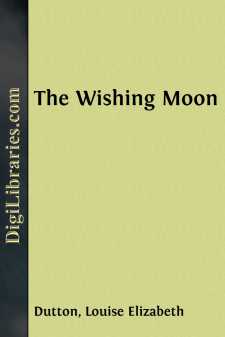Categories
- Antiques & Collectibles 13
- Architecture 36
- Art 48
- Bibles 22
- Biography & Autobiography 813
- Body, Mind & Spirit 142
- Business & Economics 28
- Children's Books 17
- Children's Fiction 14
- Computers 4
- Cooking 94
- Crafts & Hobbies 4
- Drama 346
- Education 46
- Family & Relationships 57
- Fiction 11829
- Games 19
- Gardening 17
- Health & Fitness 34
- History 1377
- House & Home 1
- Humor 147
- Juvenile Fiction 1873
- Juvenile Nonfiction 202
- Language Arts & Disciplines 88
- Law 16
- Literary Collections 686
- Literary Criticism 179
- Mathematics 13
- Medical 41
- Music 40
- Nature 179
- Non-Classifiable 1768
- Performing Arts 7
- Periodicals 1453
- Philosophy 64
- Photography 2
- Poetry 896
- Political Science 203
- Psychology 42
- Reference 154
- Religion 513
- Science 126
- Self-Help 84
- Social Science 81
- Sports & Recreation 34
- Study Aids 3
- Technology & Engineering 59
- Transportation 23
- Travel 463
- True Crime 29
The Wishing Moon
Description:
Excerpt
CHAPTER ONE
A little girl sat on the worn front doorsteps of the Randall house. She sat very still and straight, with her short, white skirts fluffed daintily out on both sides, her hands tightly clasped over her thin knees, and her long, silk-stockinged legs cuddled tight together. She was bare-headed, and her short, soft hair showed silvery blonde in the fading light. Her hair was bobbed. For one miserable month it had been the only bobbed head in Green River. Her big, gray-green eyes had a fugitive, dancing light in them. The little girl had beautiful eyes.
The little girl was Miss Judith Devereux Randall. She was eleven years old, and she felt happier to-night than she remembered feeling in all the eleven years of her life.
The Randalls' lawn was hedged with a fringe of lilac and syringa bushes, with one great, spreading horse-chestnut tree at the corner. The house did not stand far back from the street. The little girl could see a generous section of Main Street sloping past, dark already under shadowing trees. The street was empty. It was half-past six, and supper-time in Green River, but the Randalls did not have supper, they dined at night, like the Everards. To-night mother and father were dining with the Everards, and the little girl had plans of her own.
Father was dressed, and waiting, shut in the library. Mother was dressing in her big corner room upstairs, with all the electric lights lighted. The little girl could see them, if she turned her head, but mother was very far away, in spite of that, for her door was locked, and you could not go in. You could not watch her brush her long, wonderful hair, or help her into her evening gown. Mother's evening gown was black this summer, with shiny spangles—a fairy gown. Mother had to be alone while she dressed, because she was going to the Everards'.
There were two Everards, the Colonel, who was old because his hair was white, and his wife, who wore even more beautiful clothes than mother. She had heard her father say that the Colonel had made the town, and she had heard Norah, the cook, say that he owned the town. She had an idea that these two things were not quite the same, though they sounded alike, for father was fond of the Colonel, and Norah was not. At any rate, he was president of the bank—father and Norah agreed about that—and he lived in a house at the edge of the town, in what used to be a part of Larribees' woods. Father used to go Mayflowering there, but now nobody could.
The house was ugly, with things sticking out all over it, towers and balconies and cupolas, and it was the little girl's twin. She was born the year the Everards settled in Green River.
"And you're marked with it," Norah said, in one of their serious talks, when Mollie, the second girl, was out, and the two had the kitchen to themselves. Norah was peeling apples for a pie, and allowing her unlimited ginger-snaps, straight from the jar. "Marked with it, Miss Judy."
"What?"
"That house, and what goes on in it."
"What does go on?"
"You'll know soon enough."
"I'm not marked with it. I've got a birthmark, but it's a strawberry, on my left side, like the princesses have in the fairy tales."
"You are a kind of a princess, Miss Judy."
"Is that a bad thing to be, Nana?"
"It's a lonesome thing."
"My strawberry's fading. Mother says it will go away."
"It won't go away. What we're born to be, we will be, Miss Judy——. Bless your heart, you're crying, with the big eyes of you. What for, dear?"
"I don't know. I don't want to be a princess. I don't want to be lonesome. I hate the Everards."
"Well, there's many to say that now, and there'll be more to say it soon." Norah muttered this darkly, into her yellow bowl of apples, but Judith heard: "Here, eat this apple, child. You musn't hate anybody."
"I do. I hate the Everards."
Queer things came into your head to say when you were talking with Norah, who had an aunt with the second sight, and told beautiful fairy tales herself, and even believed in fairies; Judith did not....


